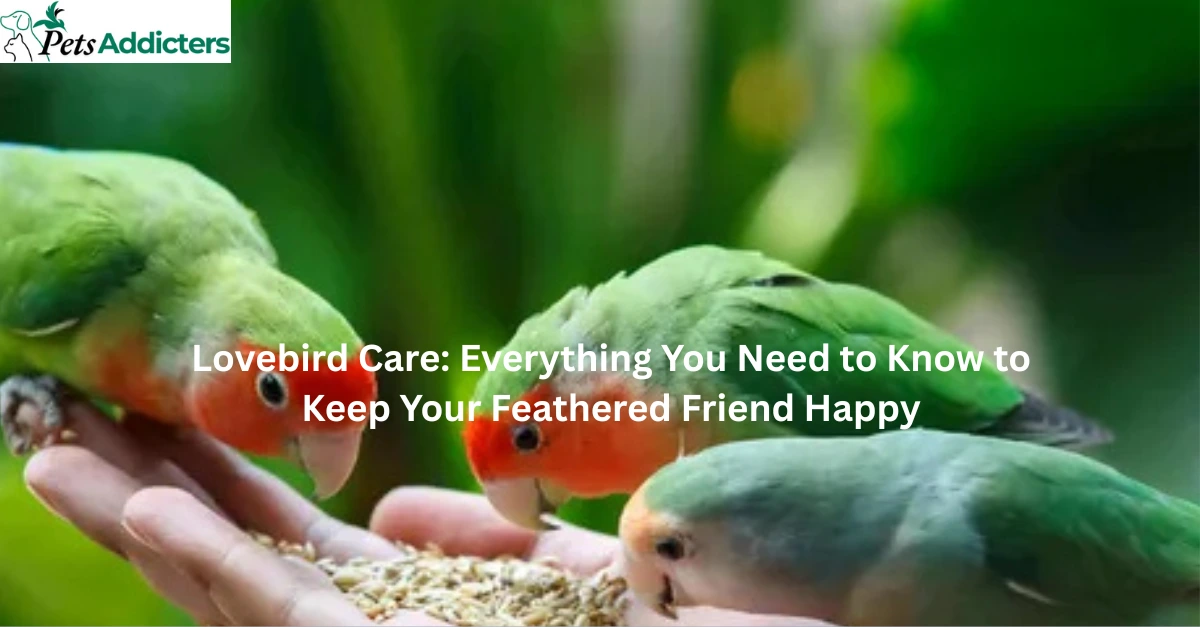You won’t believe this, but lovebirds are actually one of the most affectionate and most playful little parrots you can get. I mean, they’re “lovebirds” for a reason! These tiny bundles of feathers are just full of personality and can just turn into your best bud if you know how to care for them.”.
So, let’s talk about lovebird care what they need, what they love, and what you absolutely should avoid.
Knowing Lovebirds
This is my personal belief: you have to be familiar with their nature first before you take a lovebird at home. Lovebirds are tiny parrots that require companionship. They don’t object to living alone, but honestly, they adore living with a companion. If you won’t be able to give much time to them on a daily basis, then it’s better to take a pair.
They’re sassy, social, and playful. Think of a little bird giving you orders. That’s a lovebird, yah.
The Right Cage Setup
A lovebird’s worst enemy is a small cage. Lovebirds are energetic birds, so let them have space to stretch their wings. The minimum cage size should be 24x24x24 inches for a pair.
Add natural perches, toys, and ladders for them to keep busy. They love climbing and chewing, so wooden toys are perfect.
Tip: Place the cage in a sunny quiet corner of your home lovebirds love company but hate pandemonium.
The Perfect Diet
This is the catch lovebirds do not live on seeds. A balanced diet keeps them happy and healthy.
Feed them a mix of:
- Pellets (60%) – for nutritional balance.
- Fresh fruits and vegetables (30%) – like apples, carrots, spinach, and corn.
- Nuts and seeds (10%) – only as treats.
- And don’t feed them chocolate, avocado, or caffeine—toxic to birds.
- What do you think—amazed at how similar their diet is to our own? Fresh and vibrant!
Daily Interaction and Bonding
You won’t believe how affectionate lovebirds get when they trust you. Spend at least 30 minutes a day with them through talking, whistling, or playing.
With one bird, daily interaction is crucial otherwise, it will get lonely or vicious.
Try hand training or easy tricks with your lovebird. It encourages trust and keeps their tiny minds sharp.
Bathing and Grooming
Lovebirds love water! Give them a shallow bowl of lukewarm water or use a mist spray every few days. Bathing helps keep their feathers clean and shiny.
Also, trim their nails occasionally (or let a vet do it if you’re not comfortable). Overgrown nails can cause discomfort.
Health and Wellness
Here’s something important lovebirds are great at hiding sickness. Keep an eye out for:
- Fluffed-up feathers
- Lethargy
- Loss of appetite
- Unusual droppings
If you notice any of these, it’s time to take the vet visit.
Pro tip: Visit your vet every now and then (once a year) to prevent serious health issues.
Keeping Mentally Active
Lovebirds are smart. Like, really smart. If you don’t provide them with something to do, they will start plucking out their feathers because they’re bored.
Switch toys every few weeks, talk to them a lot, and play some out-of-cage time so they can explore.
Trust me they’ll pay you back handsomely with nonstop talking, pecking, and goofy antics.
Sleep and Comfort
Your lovebird needs 10–12 hours of quiet nighttime sleep. Cover their cage with a light, airy drape to provide an inky black, cozy sanctuary.
And no blinding lights or deafening noise—soft nights translate into sunny mornings.
Lovebird Lifespan and Long-Term Care
With good care, lovebirds can live 10–15 years, and frequently more! They’ll be family, part of your morning routine, and probably your evening entertainment too.
So, show ’em some love, feed ’em, and keep ’em stimulated—they’ll pay you back in affection that won’t be forgotten anytime soon.
Wrapping It Up
Taking care of a lovebird is a breeze it’s just all about regularity, affection, and a bit of patience. Show them lots of attention, a nutritious diet, and a cozy home, and they will fill your life with joy and song.
Should you be planning to get one, I urge you to do so. You will never look at mornings in the same light again—with their songs, cuddles, and chirps of a wee beak.
Do lovebirds need a partner?
It’s best to keep them in pairs if you can’t interact with them daily. They’re social birds and thrive on companionship.
What do lovebirds eat?
mix of pellets, fruits, veggies, and seeds. Avoid chocolate, avocado, and caffeine.
How long do lovebirds live?
With proper care, they can live between 10–15 years.
Can lovebirds talk?
They can mimic sounds but aren’t as talkative as larger parrots

